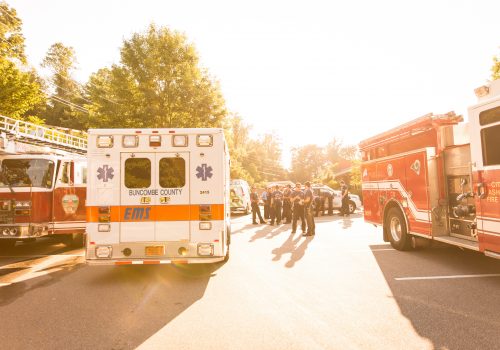Knowing what constitutes an emergency, where to get help and what to do while you’re waiting for help can save a life.
When in doubt, it’s best to call an ambulance or university police for assistance even if you think you can get to the hospital faster by driving yourself.
Recognize Emergency Warning Signs
Some warning signs of a medical emergency include:
- Difficulty breathing or shortness of breath
- Chest or upper abdominal pain or pressure
- Fainting
- Sudden dizziness
- Weakness or change in vision
- Confusion or change in mental status
- Sudden severe paid
- Bleeding that won’t stop
- Severe or persistent vomiting
- Coughing up or vomiting blood
- Suicidal or homicidal feelings
Know Who to Call and Where to Get Help
You can always dial 911 to be connected to emergency services. In Buncombe County you will be immediately connected to Fire/EMS dispatch. If you are on campus, you can also contact University Police at 828.232.5000 to dispatch an officer and call the ambulance for you.
It’s important to tell dispatchers your exact location. Calling from a cell phone does not always display your information and location accurately. Try to look for nearby street signs or room numbers. Stay on the line with the dispatcher until you are instructed to disconnect. You may be asked to provide the following information:
- If the injured is male or female
- Type of injury or problem. How did the injury occur? (feel, struck by a vehicle, accident, etc.)
- The individuals present condition (unconscious, etc.)
- The phone number you are calling from
Faculty/Staff Work Injuries
Emergency treatment for job-related work injuries or medical illnesses should be reported to University Police. Medical attention will be proctored if necessary, and all incidents will be reported to the Human Resources department and Environmental Health and Safety for investigation.
Learn What to Do Until Help Arrives
Knowing CPR and choking rescue procedures is important. It’s also important to know the basics of first aid to stop serious bleeding, manage shock, or handle fractures until emergency help arrives.
You can find emergency first aid, CPR, and other classes offered locally through the Asheville Area Red Cross. The local area chapter building is located less than a mile from campus at 100 Edgewood Rd., Asheville, NC 28804. There is a campus shuttle route located less than a block away at the intersection of Merrimon Ave./Edgewood Rd.
Learn What Not to Do
- Never move anyone who is unconscious or has struck their hand or was injured in a car crash, unless he or she is in danger.
- When treating burns, don’t use ice, butter, or petroleum jelly. If burns blister, are large or deep, get immediate help.
